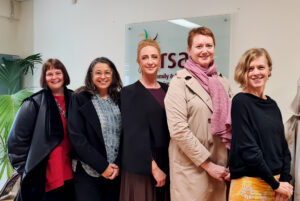 As part of FRSA’s submission to DSS’ Consultation “Supporting Improvements to the Families and Children Activity” earlier this year, FRSA did invest a lot of time and energy ‘reimagining’ the Outcomes Framework that is intended to underpin this activity moving forward. Whilst plenty of organisations could easily ‘see themselves’ in the Outcomes Framework as proposed in the Discussion Paper, we did feel that this conversation gave us an opportunity to look deeply into what the services are attempting to achieve with the people and communities they work with. We asked: how will family and relationships services show they have made gains? Who benefits from these services and why? And what are the ‘external factors’ impacting on the services’ ability to deliver impact/outcomes?
As part of FRSA’s submission to DSS’ Consultation “Supporting Improvements to the Families and Children Activity” earlier this year, FRSA did invest a lot of time and energy ‘reimagining’ the Outcomes Framework that is intended to underpin this activity moving forward. Whilst plenty of organisations could easily ‘see themselves’ in the Outcomes Framework as proposed in the Discussion Paper, we did feel that this conversation gave us an opportunity to look deeply into what the services are attempting to achieve with the people and communities they work with. We asked: how will family and relationships services show they have made gains? Who benefits from these services and why? And what are the ‘external factors’ impacting on the services’ ability to deliver impact/outcomes?
As we look to the Federal Budget next week, I am reminded that so many vital decisions that we describe as ‘external factors’ in the Outcomes Framework are vested with the Federal Government and the funding decisions they make. The decisions made by the Federal Government impact on the ability of our service providers to achieve their goals and projected outcomes with the people they are working with. ‘External Factors’ such as Material Basics (housing, financial security/income, technology) and socio-economic conditions including employment opportunities come very clearly to the fore given contemporary conversations.
Once again the vast amount of research and evidence points to the fact that current levels of income support are insufficient to support individuals and families to live a decent life, free from poverty and hardship. This amplifies the importance of secure housing in providing a strong base for individuals and families.
Anglicare Australia’s snapshot of housing affordability is a stark reminder of how unattainable some of these basics are for the 1.6 million people now reliant on JobSeeker or Youth Allowance as their main form of income (important side note, the current rate of JobSeeker will leave one in six children living in poverty). Out of 74,000 rental listings across Australia the rental affordability shapshot found that there were only three rental listings that would be affordable for these people.
For people living with family violence we know that financial security and housing availability weigh heavily on their decision to stay or leave their offending partner. The risk of homelessness and financial instability are significant realities for people escaping family violence.
I should at this point acknowledge that not all the funding and policy responsibility sits with the Commonwealth Government on these issues and importantly states and territories have their role to play.
Next week’s Budget will once again be focused on securing Australia’s economic security against the backdrop of the pandemic. It will be interesting, as always, to see how the Government’s Budget decisions reveal their policy priorities moving forward.
We will, as always, be working on Budget night and will be delivering to our members the view of the Federal Budget through an FRSA lens. So, for FRSA Members Delegates reading this e-bulletin, be sure to check your inboxes on Wednesday morning!

On a different note, it was great to have Rae Kaspiew and Kelly Hand from the Australian Institute of Family Studies visit us yesterday for a catch up and then a quick hello from Susan Cochrane from Relationships Australia National.
I am also really pleased to let readers know that we have recently signed off on our agreement with AIFS to undertake the Telepractice Research with the FRSA membership, which is very exciting! We will have more information to follow in the next few weeks.
By Jackie Brady





